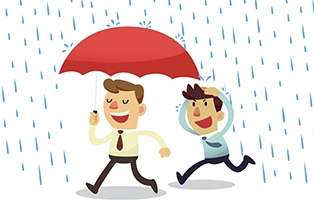Responsible companies pay for irresponsible ones

Oh, does the producer responsibility for packaging apply to us too?
Tuomo Aunola, Senior Advisor at the Pirkanmaa ELY Centre, says that he hears this question all too often. Together with his colleagues, Aunola oversees the implementation of the producer responsibility scheme. The contents of the Waste Act are not familiar to everyone – or are deliberately ignored.
“Companies that place packaging on the market and have a turnover of at least one million euros have statutory producer responsibility for their packaging,” says Aunola.
According to Aunola, it is impossible to say exactly how many companies neglect their obligations.
“The statistical sources required are not available, and companies are founded and go out of business all the time. Their number is in the hundreds though.”
Free riders’ packaging ends up in the system, but they do not participate in paying the costs.
“Decent companies pay the costs on behalf of the free riders. Free riders, of course, also distort competition.”
Ignorance and calculation
Aunola estimates that free riders’ actions can often be explained by genuine ignorance.
“Packaging may only be an unimportant sideline in the business, and companies don’t know the rules. The vast majority of companies take care of the issue when they hear that it’s a matter of statutory operations and that producer organisations don’t make money out of it.”
Sometimes, however, free riders simply want to save money. In these cases, it may be necessary to motivate companies by telling them about the tougher methods available for enforcing the scheme.
“We can impose a fee for negligence equal to one per cent of the company’s turnover but not more than 500,000 euros, and we can also start a penalty payment procedure.”
The Pirkanmaa Ely Centre receives tips from producer organisations in the packaging industry and Rinki regarding companies that may have neglected their obligations under the producer responsibility scheme. However, resources to control the companies are limited.
“The most effective way to fight free riders is to increase awareness. Producer organisations are in a key position.”
120,000 tonnes of unrecorded packaging waste
Maija Peltola from Finnish Packaging Recycling RINKI Ltd explains that more than 4000 companies with producer responsibility are registered with Rinki.
“The producer organisations and Rinki take care of the producer responsibility on behalf of these companies.”
Rinki and Statistics Finland commissioned a packaging waste survey on the Ministry of the Environment’s initiative in 2015. It shows that about 120,000 tonnes of packaging waste is not entered into the packaging statistics, the total volume included in the statistics being about 710,000 tonnes.
Most of the unrecorded packaging is placed on the market by free riders while the rest comes from companies with a turnover of less than one million euros and the packaging brought to the country by consumers and distance sales.
“According to the survey, the share of unrecorded packaging placed on the market by free riders is more than 60 per cent. More than 90 per cent of the free riders fall into the turnover category of 1-2 million euros,” says Peltola.
Rinki is proactive
Every year, Rinki contacts dozens of companies that are believed to place packaged products on the market but do not meet their obligations.
“Companies are told about the producer responsibility and the possibility of handling their obligations by joining Rinki. Some companies agree to join the system but, unfortunately, some fail to fulfil their obligations and thus increase the burden on the responsible companies. Some 140 companies have joined Rinki in 2017,” says Peltola.
Rinki member companies are published online at Rinkiin.fi/for-firms.
Finding free riders is difficult
Tommi Jansson is writing his master’s thesis for the Faculty of Law at the University of Turku on why monitoring free riders is so difficult and how the monitoring could be more efficient.
“Producer responsibility is regulated by the EU, but it’s impossible to maintain sufficient control at national level. Information is not available to help find the free riders.”
As Finland is part of the EU’s single market, the customs, among other authorities, do not have comprehensive information on the freight traffic between the member states. Equally, certain data collected for statistics cannot be shared for monitoring purposes.
“There is no legal obligation to submit the data. The EU has decided that the free movement of goods goes before producer responsibility.”
Jansson is studying the possibility of using the data collected for the VAT register to find free riders.
7.12.2017
Text Matti Välimäki
Illustration Liisa Seppo